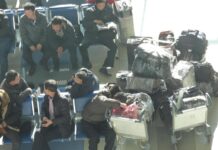Although the North Korean regime relies on the application
of fearpolitik to maintain stability, the relaxation of market restrictions can
also be viewed as an attempt to enhance broader support. It is additionally
asserted that Kim Jong Un is using the country’s first Party Congress in 36
years to further consolidate power. Domestically, however, evidence suggests
that public support for the regime is changing.
“Over the last few years as market restrictions have
relaxed, residents are increasingly noting that ‘business is good and there’s
enough to eat.’ However, about Kim Jong Un, some are commenting that the
restrictions have not been eased out of concern for the lives of the North
Korean population, but rather because he ‘understands the value of the
jangmadang [markets, official or otherwise] as a lucrative source of revenue,’”
a source from South Pyongan Province said in a telephone call with Daily NK on
April 22.
Of particular note, residents who have traveled abroad to
places like China or Russia are generally more critical of the regime than
those without experience abroad.
These residents often share their observations and thoughts
with family members and close friends upon their return. Some are noting the
irony of the “happily beaming faces [referring to the ubiquitous portraits of
Kim Il Sung and Kim Jong Il throughout North Korea] that have failed to provide
rations to the people,” while lamenting the “closed door foreign policies that
hamper the country’s development.”
According to a separate source in North Pyongan Province,
making even private criticisms toward the supreme leader during the time
of Kim Il Sung or Kim Jong Il was a much more treacherous prospect. Kim Jong
Un’s father and grandfather were the subjects of blind admiration to a much
wider degree, the result of tireless idolization efforts on the part of the
authorities. But as information from the outside world has been seeping in due
to increased market activity, Kim Jong Un is bearing the brunt of increasingly
negative public opinion.
“During Kim Il Sung’s time, it was unthinkable to criticize
the leader in this way. It was widely believed that he was the supreme leader
of a powerful nation. However, these days, residents are more freely analyzing
and comparing each leader and are becoming less concerned with hiding it [from
each other],” the source explained.
Specific examples, the source went on, include referring to
“Kim Il Sung’s reign as ‘the labor era,’ Kim Jong Il’s time as the ‘Songun
[military-first politics] era,’ and Kim Jong Un’s rule as ‘the market era.’”
“Just a few short decades ago, people were blindly trusting
the country’s leaders, but now the market is opening their eyes to the ways of
the world,” the source noted.
One striking example of this took place in March, wherein a
number of neighborhood elders gathered to play janggi [Korean chess] and one
observer impulsively remarked, “The son is worse than his father!”, an abstract
but widely understood backhand criticism of the regime.
As soon as the phrase escaped his lips, “a State Security
Department [SSD] agent who overheard had him hauled away,” the source
continued. “But the hapless senior stubbornly persisted that he was talking
about his own family and was eventually released.”
Daily NK staff have also observed substantive differences in
public opinion toward the regime, largely reliant on an individual’s class,
living standards, and surrounding environment.
“Some residents lived well under Kim Il Sung, but suffered
during the famine under Kim Jong Il, so they refer to that era as ‘the
murderer’s reign.’ Conversely, other residents are saying that during Kim Il
Sung’s time, although the public distribution system was still in effect, it
was nonetheless a time of deep restrictions. In contrast, Kim Jong Il’s time
brought a period of relatively more openness and the ability to engage in
market activity. People of this type of opinion tend to view Kim Jong Il and
Kim Jong Un a bit more positively [relative to Kim Il Sung],” the source said.
“For cadres, public criticism of the regime is a scary
prospect, but they have been known to periodically make a remark or two in the
company of extremely close companions who are trusted. They sometimes comment
on how ordinary residents had more reasons to be fearful during the Songun era,
“but these days it’s the cadres who are constantly racked with anxiety,” the
source continued.
Nevertheless, there are some residents who praise Kim Jong
Un, not out of loyalty, but because they have been better able to pursue
improvements to their own livelihoods under his rule than in the past.
“There are a minority of people who say that the cadres who
only look after themselves have been sacked and politics are becoming more
based on the people,” the source added, “but the majority of these people are
individuals who have not experienced the misfortune of having their business
assets confiscated by state organizations or been falsely charged of crimes by
cadres in the past.”




















